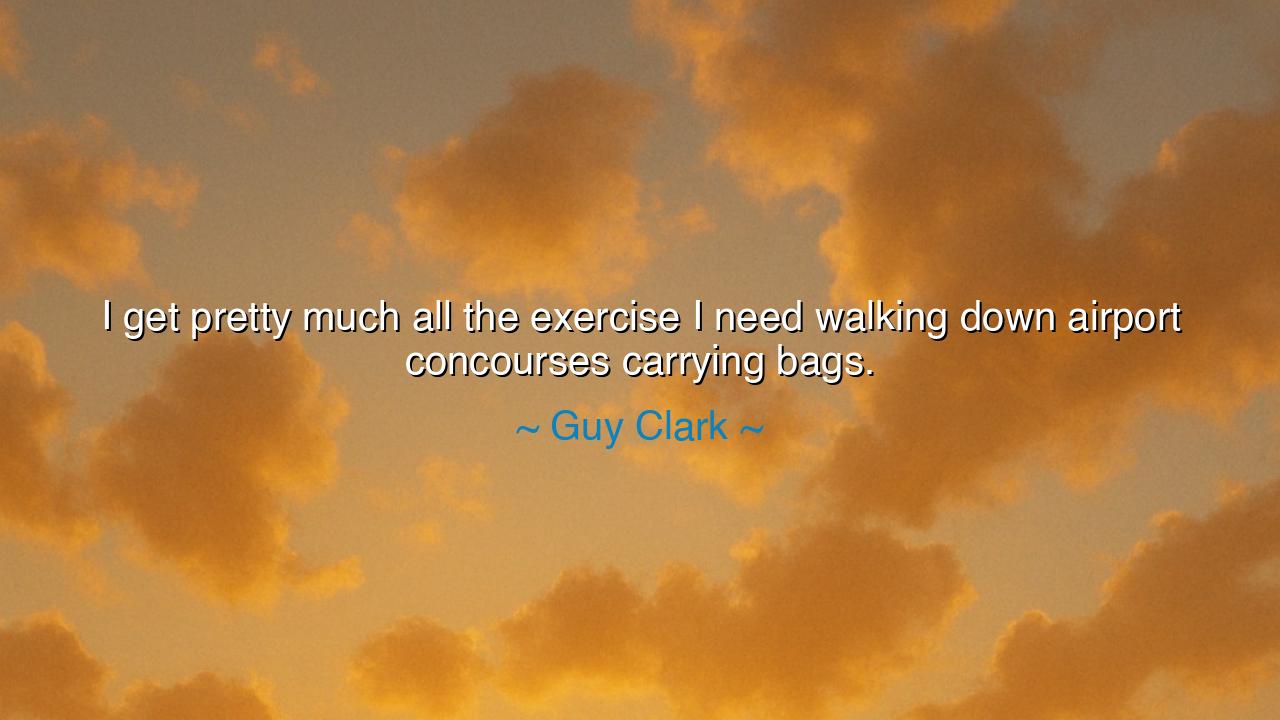
I get pretty much all the exercise I need walking down airport
I get pretty much all the exercise I need walking down airport concourses carrying bags.






Hear, O traveler, the words of Guy Clark, who mused with gentle humor: “I get pretty much all the exercise I need walking down airport concourses carrying bags.” At first glance, this saying may sound like a jest, a light-hearted remark about the weariness of travel. Yet within it lies a truth of the human condition: that the burdens we carry in life often provide us the very strength we seek, and that toil itself, however mundane, can become our hidden discipline.
The image of the airport concourse is more than the description of a place. It is a symbol of the endless passageways of modern life, where men and women rush with their burdens, caught between departure and arrival. The bags they carry are not only of clothes and belongings, but of responsibilities, memories, and desires. To walk these long corridors is to live the rhythm of existence: step after step, weight upon the shoulders, movement toward some distant gate. In this, Guy Clark saw his own exercise, his own training, not of body alone, but of spirit.
The ancients, too, knew this wisdom. The Stoic philosophers declared that every hardship endured, every weight borne, strengthens the soul as exercise strengthens the body. Heracles, the hero, gained his glory not by ease but by his labors, carrying lions, cleaning stables, and bearing the heavens upon his shoulders. So too does the modern traveler, carrying his bags, gain quiet strength not from gyms or arenas, but from the unseen trials of daily life. What appears ordinary is, in truth, heroic practice.
Consider also the life of soldiers on long campaigns. They did not train in polished halls but by marching endless miles, armor pressing upon their backs, weapons heavy in their hands. It was not glamorous, but it forged endurance. In the same way, Clark points out that even in our ordinary days, the act of carrying—whether bags in an airport or duties in our lives—becomes the exercise that shapes us. We are strengthened not only in moments of chosen discipline, but in the unnoticed struggles that travel with us.
There is also in this saying a thread of irony. For many, exercise is seen as a special pursuit, something separate from life, sought in gyms and routines. Yet Clark reminds us that exercise is already woven into the fabric of existence. The weight of burdens, the length of the road, the persistence of walking—these provide all the strength one needs. It is a call to see the ordinary with fresh eyes, to realize that the discipline we seek is often hidden in the daily path we walk without noticing.
O listener, learn this: do not despise the bags you carry, nor the corridors you walk in your own life. Though they may seem trivial, though they may weary you, they are the very trials that strengthen your heart and body. The burden itself is the training, the journey itself the preparation. What you call inconvenience may, in truth, be the silent forge of your endurance.
Practical wisdom follows: embrace the labors that come unasked. When you walk long roads, when you carry heavy loads, when you face daily tasks that press upon you—see them not as punishment, but as practice. Let each duty become your exercise, each journey your training ground. For it is in carrying life’s bags, both literal and symbolic, that you grow strong enough to face greater challenges.
Thus I say to you: heed the humor and wisdom of Guy Clark. The airport concourse is the road of everyman, and the bags are the burdens of life. Walk them with patience, carry them with strength, and see in them your hidden exercise. For in the end, it is not the chosen struggles but the daily burdens that shape the might of the soul.






AAdministratorAdministrator
Welcome, honored guests. Please leave a comment, we will respond soon